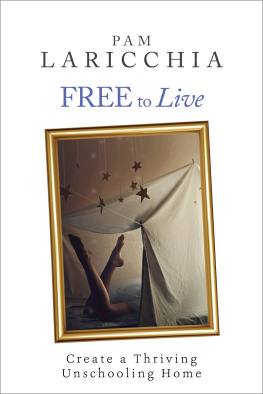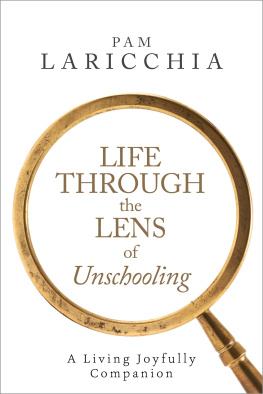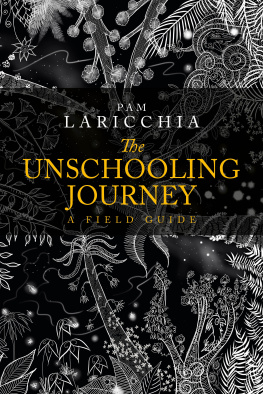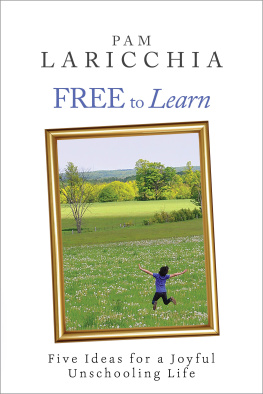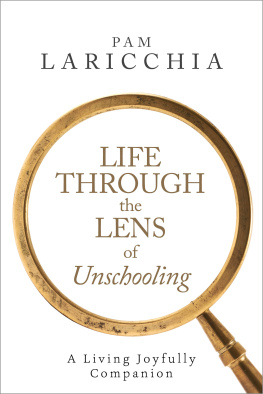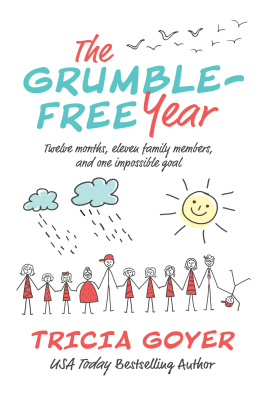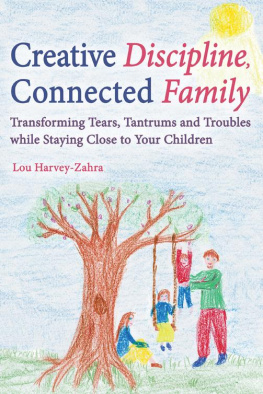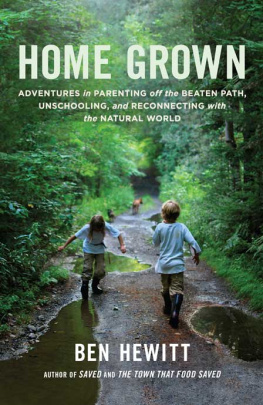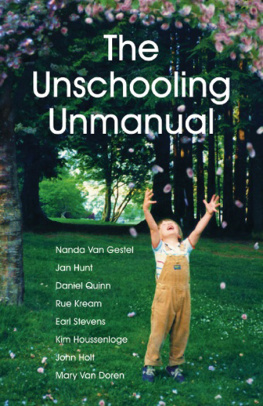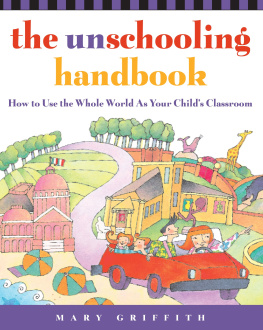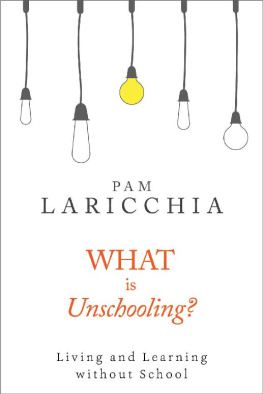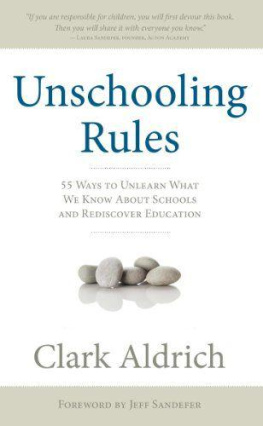Contents
Free to Live
Create a Thriving Unschooling Home
PAM LARICCHIA
Copyright 2013 Pam Laricchia
All rights reserved.
Published by
Living Joyfully Enterprises
Erin, Ontario, Canada
ISBN-13: 978-0-9877333-3-7
Edited by Alexandra Peace
Cover design by Jane Dixon-Smith
Cover photo by Lissy Laricchia
I dedicate this book to the wonderful unschooling parents who, over the last decade, have spent a significant amount of their online time sharing their family's unschooling experiences, helping me and countless others on our unschooling journeys. They are a big part of the reason why my relationships with my children are so strong and for that I am intensely grateful.
Introduction
Hi, I'm Pam Laricchia. I thought I'd share a bit about my journey to unschooling. Our familymyself and my husband Rocco, along with our three children, Joseph, Lissy, and Michaelhas been unschooling in Ontario, Canada since 2002. That's when I discovered homeschooling (and soon after, unschooling) and the kids happily took us up on our offer to stay home to learn.
My backstory includes a successful academic career, earning an Engineering and Management bachelor's degree through a unique five-year university program. I found an interesting job, married the terrific man I met at a summer job during my university career, and we had our three children over the next five years. It has always been in my nature to question things that don't seem to make sense in my world, but even as my parenting began veering from the mainstream, it didn't occur to me to question the school system when my eldest reached school age. I do remember thinking it would be an interesting ride when we walked out of Joseph's junior kindergarten teacher interview, during which he didn't say a word to answer her questions. He smiled and explained to me that he didn't feel like talking to her today, but that he'd speak to her once he started school. I laughed and tousled his hair.
In those first years some teachers were more flexible, while others were quite determined to shave off his uniqueness. I researched, I left my career to stay home full-time, and I worked with his teachers and principals to try to help them better understand him. I even gave a presentation about spirited kids at a teacher's meeting and donated books to the library for other parents. Most of the teachers understood what I was talking about, but their feedback was that they don't have the time to work with kids outside the personalities and learning styles that mesh with the classroom setting. The kids have to fit the surroundings, not the other way around. It became clear to me that he would not thrive in public school. In my continued quest to find a learning environment that worked well for him, I found a specialized private school. The environment was betterthe teachers and staff were being paid to work outside the typical linesbut still not great.
Then, through still more research, I came across the concept of homeschooling and was thrilled to discover it was legal in Canada. Rocco and I discussed it at length over the next couple of weeks and realized that there seemed no downside to trying it out for a year; if it didn't work out they could return to school. It was March Break and none of the kids went back. They were ecstatic with their newly-found playtime and I was now happily researching homeschooling. I soon discovered the notion of unschooling and after a couple weeks of trying to entice them to do some workbooks, I realized I was hindering, not helping, their learning. We spent the next months deschooling and living and having a great time. Eventually I realized we were truly unschooling and we haven't looked back since!
A Free to Learn Primer
My first book, Free to Learn , is about the five ideas, and resulting paradigm shifts, I found most helpful as I learned about unschooling. It's more than just not going to schoolunschooling is about creating a different kind of learning environment. I have included a quick synopsis here because I think it's important to have a good understanding of the principles behind unschooling before tackling this book. Free to Learn helps you understand what unschooling is and why you might want your children to learn in this way, whereas Free to Live digs into the details of how to create a thriving unschooling environment. Life can flow more smoothly when you understand your goal before figuring out how to reach it.
The first idea, or unschooling principle, discussed in Free to Learn is that learning is best defined by the learner. Instead of looking at learning from the teacher's point of view, it's more accurate to look at it from the learner's point of view. Real learning, learning that is understood and remembered, is best defined by the learner precisely because it can only take place in the learner, regardless of any teaching being done around the learner. If you find yourself using or thinking the word teach , take a moment to rethink the situation and substitute the word learn .
The second principle is that learning is found everywhere. Though many educational experts espouse the idea that they should define what, when, how, and where children learn, unschoolers shift that paradigm. Learning need not be defined as exclusively occurring in classrooms, during school hours, with those of school age; it can be found everywhere, at anytime, and can happen at any age. With this in mind, watch your kids as they play and you'll soon see so much learning.
The third unschooling principle is that choices are the key to learning. Parents who make most of the decisions for their child growing up are eager to model the right thing to do so that their children will remember and make those same choices as young adults and beyond. But instead of learning what choices to make, isn't it better to learn how to make informed choices? That way they are better equipped to deal with new situations as they arise.
The fourth idea is why not yes? We often hear the message that it's important for parents to set boundaries for their children, and a definitive no helps the parents stay in control. Sure, saying no can make life seem easier in the moment, but saying yes encourages children to explore their world and cultivates their ability to live confidently in it. Take a moment to ask yourself if that automatic no is really necessary.
The fifth unschooling principle is that kids are people too. It can seem like parents have, by virtue of age and childbirth, earned a position of power, but everyone in the family has important needs and wants and can have a voice, without it leading to chaos.
If any of those ideas left you puzzled, I'd recommend reading Free to Learn before you dig into the ideas in this book. Otherwise you might just end up feeling even more flummoxed!
Will Unschooling Work for My Child?
If the principles behind unschooling make sense to you, the next step is to consider whether this learning lifestyle is something you want to pursue with your own family. At this point parents often ask, Will unschooling work for my child?
The short, and truthful, answer to this question is an emphatic yes . Unschooling, done well, will work for any child. Its tailored to the childs interests, needs, and personality after all. But what most questioners don't yet realize is that this is not the question they should be asking to figure out if unschooling will work well in their family. What they should really be asking is, Will I be able to unschool my child?
Do you see the distinction? It's a subtle but very important difference that speaks to the point of view of the question. It is the parents responsibility to cultivate the learning environment for the child, not the childs responsibility to figure out how unschooling will work best for them.

